List of shoguns
From Wikipedia, the free encyclopedia
This article is a list of shoguns that ruled Japan intermittently, as hereditary military dictators,[1] from the beginning of the Asuka period in 709 until the end of the Tokugawa shogunate in 1868.[a]
This article needs additional citations for verification. (January 2024) |
Asuka / Heian periods (709–1184)
Summarize
Perspective
Note: there are different shogun titles. For example, Kose no Maro had the title of Mutsu Chintō Shōgun (陸奥鎮東将軍, lit. "Great General of Subduing Mutsu"). Ki no Kosami had the title of Seitō Taishōgun (征東大将軍, lit. "Commander-in-chief for the pacification of the East") [5] in 789 which is less important than Sei-i Taishōgun. Ōtomo no Otomaro was the first person who was granted the title of Seii Taishōgun (征夷大将軍, lit. "Great appeasing general of the barbarians"). Sakanoue no Tamuramaro was the second, and Minamoto no Yoritomo was third person who had the title of Sei-i Taishōgun.
| No. | Portrait | Name (birth–death) |
Shogun from | Shogun until |
|---|---|---|---|---|
| 1 |  |
Kose no Maro |
709 | |
| 2 | 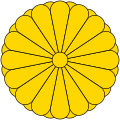 |
Tajihi no Agatamori |
720 | 721 |
| 3 |  |
Ōtomo no Yakamochi (c. 718–785) |
784 | 785 |
| 4 |  |
Ki no Kosami |
788 | 789 |
| 5 |  |
Ōtomo no Otomaro (731–809) |
793 | 794 |
| 6 | 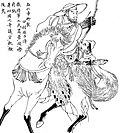 |
Sakanoue no Tamuramaro (758–811) |
797 | 808 |
| 7 |  |
Funya no Watamaro (765–823) |
811 | 816 |
| 8 |  |
Fujiwara no Tadabumi (873–947) |
940 | |
| 9 |  |
Minamoto no Yoshinaka (1154–1184) |
1184 | |
Kamakura shogunate (1192–1333)
| No. | Portrait | Name (birth–death) |
Shogun from | Shogun until |
|---|---|---|---|---|
| 1 | 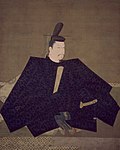 |
Minamoto no Yoritomo (1147–1199) |
1192 | 1199 |
| 2 |  |
Minamoto no Yoriie (1182–1204) |
1202 | 1203 |
| 3 |  |
Minamoto no Sanetomo (1192–1219) |
1203 | 1219 |
| 4 |  |
Kujō Yoritsune (1218–1256) |
1226 | 1244 |
| 5 |  |
Kujō Yoritsugu (1239–1256) |
1244 | 1252 |
| 6 |  |
Prince Munetaka (1242–1274) |
1252 | 1266 |
| 7 |  |
Prince Koreyasu (1264–1326) |
1266 | 1289 |
| 8 |  |
Prince Hisaaki (1276–1328) |
1289 | 1308 |
| 9 |  |
Prince Morikuni (1301–1333) |
1308 | 1333 |
Timeline

Kenmu Restoration (1333–1336)
| No. | Portrait | Name (birth–death) |
Shogun from | Shogun until |
|---|---|---|---|---|
| 1 |  |
Prince Moriyoshi (1308–1335) |
1333 | |
| 2 |  |
Prince Narinaga (1326 – c. 1337–44) |
1335 | 1336 |
Ashikaga shogunate (1336–1573)
| No. | Portrait | Name (birth–death) |
Shogun from | Shogun until |
|---|---|---|---|---|
| 1 | 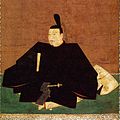 |
Ashikaga Takauji (1305–1358) |
1338 | 1358 |
| 2 |  |
Ashikaga Yoshiakira (1330–1367) |
1359 | 1367 |
| 3 |  |
Ashikaga Yoshimitsu (1358–1408) |
1369 | de jure 1395 |
| de facto 1408 | ||||
| 4 |  |
Ashikaga Yoshimochi (1386–1428) |
1395 | de jure 1423 |
| de facto 1428 | ||||
| 5 |  |
Ashikaga Yoshikazu (1407–1425) |
1423 | 1425 |
| 6 |  |
Ashikaga Yoshinori (1394–1441) |
1429 | 1441 |
| 7 |  |
Ashikaga Yoshikatsu (1434–1443) |
1442 | 1443 |
| 8 |  |
Ashikaga Yoshimasa (1436–1490) |
1449 | de jure 1474 |
| de facto 1490 | ||||
| 9 |  |
Ashikaga Yoshihisa (1465–1489) |
1474 | 1489 |
| 10 |  |
Ashikaga Yoshitane (1466–1523) |
1490 | 1493 |
| 11 | 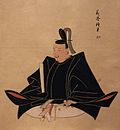 |
Ashikaga Yoshizumi (1481–1511) |
1495 | 1508 |
| (10) |  |
Ashikaga Yoshitane (1466–1523) |
1508 | 1522 |
| 12 |  |
Ashikaga Yoshiharu (1511–1550) |
1522 | de jure 1547 |
| de facto 1550 | ||||
| 13 |  |
Ashikaga Yoshiteru (1536–1565) |
1547 | 1565 |
| 14 | 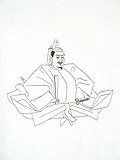 |
Ashikaga Yoshihide (1538–1568) |
1568 | |
| 15 |  |
Ashikaga Yoshiaki (1537–1597) |
1568 | deposed 1573 |
| abdicated 1588 | ||||
Timeline

Azuchi–Momoyama period (1568–1600)
The following were military dictators of Japan, de facto shoguns[citation needed] from 1568 to 1598. They unified the country, which at the start were a chaotic patchwork of warring clans.
| No. | Portrait | Name (birth–death) |
de facto shogun from |
de facto shogun until |
|---|---|---|---|---|
| 1 |  |
Oda Nobunaga (1535–1582) |
1568 | de jure 1575 |
| de facto 1582 | ||||
| 2 |  |
Oda Nobutada (1557–1582) |
1575 | 1582 |
| 3 |  |
Oda Hidenobu (1580–1605) |
1582 | 1583 |
| 1 |  |
Toyotomi Hideyoshi (1537–1598) |
1585 | de jure 1592 |
| de facto 1598 | ||||
| 2 |  |
Toyotomi Hidetsugu (1568–1595) |
1592 | 1595 |
| 3 |  |
Toyotomi Hideyori (1593–1615) |
1598 | de jure 1603 |
From 1598 to 1600, the de facto shogunate was delegated to the Council of Five Elders.
Tokugawa shogunate (1600–1868)
| No. | Portrait | Name (birth–death) |
Shogun from | Shogun until |
|---|---|---|---|---|
| 1 | 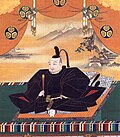 |
Tokugawa Ieyasu (1543–1616) |
de facto 1600 |
de jure 1605 |
| de jure 1603 |
de facto 1616 | |||
| 2 |  |
Tokugawa Hidetada (1579–1632) |
1605 | de jure 1623 |
| de facto 1632 | ||||
| 3 |  |
Tokugawa Iemitsu (1604–1651) |
1623 | 1651 |
| 4 |  |
Tokugawa Ietsuna (1641–1680) |
1651 | 1680 |
| 5 |  |
Tokugawa Tsunayoshi (1646–1709) |
1680 | 1709 |
| 6 |  |
Tokugawa Ienobu (1662–1712) |
1709 | 1712 |
| 7 |  |
Tokugawa Ietsugu (1709–1716) |
1713 | 1716 |
| 8 | 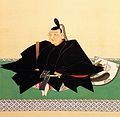 |
Tokugawa Yoshimune (1684–1751) |
1716 | de jure 1745 |
| de facto 1751 | ||||
| 9 |  |
Tokugawa Ieshige (1712–1761) |
1745 | de jure 1760 |
| de facto 1761 | ||||
| 10 |  |
Tokugawa Ieharu (1737–1786) |
1760 | 1786 |
| 11 |  |
Tokugawa Ienari (1773–1841) |
1787 | de jure 1837 |
| de facto 1841 | ||||
| 12 | 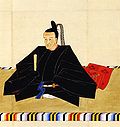 |
Tokugawa Ieyoshi (1793–1853) |
1837 | 1853 |
| 13 |  |
Tokugawa Iesada (1824–1858) |
1853 | 1858 |
| 14 |  |
Tokugawa Iemochi (1846–1866) |
1858 | 1866 |
| 15 | 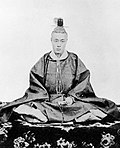 |
Tokugawa Yoshinobu (1837–1913) |
1866 | 1867[a] |
Timeline

Notes
- The Tokugawa shogunate came to its official end on 9 November 1867, when Tokugawa Yoshinobu "put his prerogatives at the Emperor's disposal" and resigned 10 days later.[2] This was effectively the "restoration" (Taisei Hōkan) of imperial rule – although Yoshinobu still had significant influence and it was not until 3 January 1868, with the Emperor's edict, that the Meiji Restoration fully occurred.[3] On that day, the Emperor stripped Yoshinobu of all power and made a formal declaration of the restoration of his power.[4]
See also
References
Bibliography
Wikiwand - on
Seamless Wikipedia browsing. On steroids.